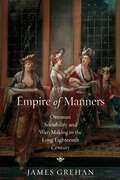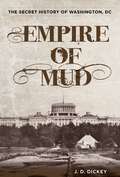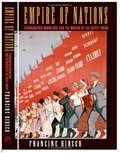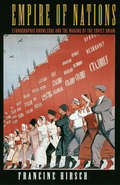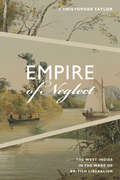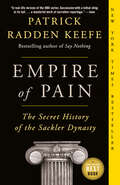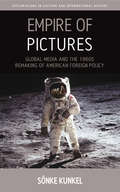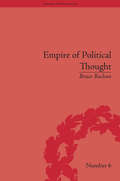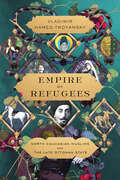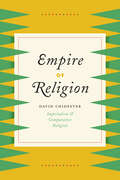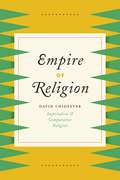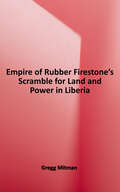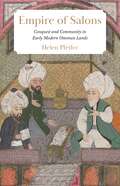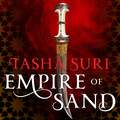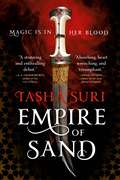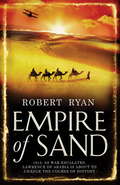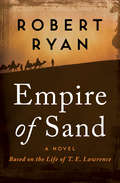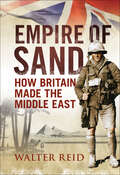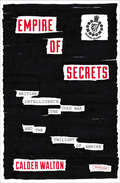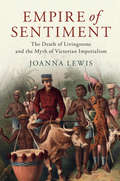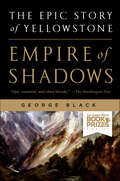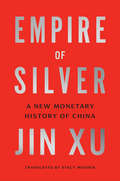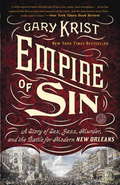- Table View
- List View
Empire of Manners: Ottoman Sociability and War-Making in the Long Eighteenth Century (Stanford Ottoman World Series: Critical Studies in Empire, Nature, and Knowledge)
by James GrehanIt is easy to believe that manners are empty gestures, little more than social artifice or practiced etiquette whose sole purpose is to project civility and facilitate social interaction. But if we look more closely, they can tell us much more than we might first suppose, revealing what conventional accounts of state, economy, and religion often ignore. With this book, James Grehan offers a panoramic view of manners and sociability across the eighteenth-century Ottoman Empire, from the Balkans to the Middle East to North Africa. Studying chronicles, biographical dictionaries, and travel accounts, he throws new light on the inner dynamics of Ottoman society during a transitional period in Ottoman history which has too often been misunderstood. Empire of Manners proposes a new way of thinking about the history of manners, arguing that violence and war-making, as much as civility and etiquette, have a central role in shaping them. The eighteenth century proved to be a turning point in this paradoxical relationship between violence and manners as war-making turned into a substantially more complex and costly enterprise, leaving a deeper and wider social footprint. The interplay between violence and manners, an unlikely couple, unexpectedly narrates the Ottoman path to the modern age.
Empire of Mud: The Secret History of Washington, DC
by J.D. DickeyWashington, DC, gleams with stately columns and neoclassical temples, a pulsing hub of political power and prowess. But for decades it was one of the worst excuses for a capital city the world had ever seen. Before America became a world power in the twentieth century, Washington City was an eyesore at best and a disgrace at worst. Unfilled swamps, filthy canals, and rutted horse trails littered its landscape. Political bosses hired hooligans and thugs to conduct the nation's affairs. Legendary madams entertained clients from all stations of society and politicians of every party. The police served and protected with the aid of bribes and protection money. Beneath pestilential air, the city’s muddy roads led to a stumpy, half-finished obelisk to Washington here, a domeless Capitol Building there. Lining the streets stood boarding houses, tanneries, and slums. Deadly horse races gouged dusty streets, and opposing factions of volunteer firefighters battled one another like violent gangs rather than life-saving heroes. The city’s turbulent history set a precedent for the dishonesty, corruption, and mismanagement that have led generations to look suspiciously on the various sin--both real and imagined--of Washington politicians. Empire of Mud unearths and untangles the roots of our capital’s story and explores how the city was tainted from the outset, nearly stifled from becoming the proud citadel of the republic that George Washington and Pierre L'Enfant envisioned more than two centuries ago.
Empire of Nations: Ethnographic Knowledge and the Making of the Soviet Union
by Francine HirschThe book examines the ways in which former imperial ethnographers and local elites provided the Bolsheviks with ethnographic knowledge that shaped the very formation of the Soviet Union.
Empire of Nations: Ethnographic Knowledge and the Making of the Soviet Union
by Francine HirschWhen the Bolsheviks seized power in 1917, they set themselves the task of building socialism in the vast landscape of the former Russian Empire, a territory populated by hundreds of different peoples belonging to a multitude of linguistic, religious, and ethnic groups. Before 1917, the Bolsheviks had called for the national self-determination of all peoples and had condemned all forms of colonization as exploitative. After attaining power, however, they began to express concern that it would not be possible for Soviet Russia to survive without the cotton of Turkestan and the oil of the Caucasus. In an effort to reconcile their anti-imperialist position with their desire to hold on to as much territory as possible, the Bolsheviks integrated the national idea into the administrative-territorial structure of the new Soviet state. In Empire of Nations, Francine Hirsch examines the ways in which former imperial ethnographers and local elites provided the Bolsheviks with ethnographic knowledge that shaped the very formation of the new Soviet Union. The ethnographers--who drew inspiration from the Western European colonial context--produced all-union censuses, assisted government commissions charged with delimiting the USSR's internal borders, led expeditions to study "the human being as a productive force," and created ethnographic exhibits about the "Peoples of the USSR." In the 1930s, they would lead the Soviet campaign against Nazi race theories . Hirsch illuminates the pervasive tension between the colonial-economic and ethnographic definitions of Soviet territory; this tension informed Soviet social, economic, and administrative structures. A major contribution to the history of Russia and the Soviet Union, Empire of Nations also offers new insights into the connection between ethnography and empire.
Empire of Neglect: The West Indies in the Wake of British Liberalism (Radical Américas)
by Christopher TaylorFollowing the publication of Adam Smith’s The Wealth of Nations, nineteenth-century liberal economic thinkers insisted that a globally hegemonic Britain would profit only by abandoning the formal empire. British West Indians across the divides of race and class understood that, far from signaling an invitation to nationalist independence, this liberal economic discourse inaugurated a policy of imperial “neglect”—a way of ignoring the ties that obligated Britain to sustain the worlds of the empire’s distant fellow subjects. In Empire of Neglect Christopher Taylor examines this neglect’s cultural and literary ramifications, tracing how nineteenth-century British West Indians reoriented their affective, cultural, and political worlds toward the Americas as a response to the liberalization of the British Empire. Analyzing a wide array of sources, from plantation correspondence, political economy treatises, and novels to newspapers, socialist programs, and memoirs, Taylor shows how the Americas came to serve as a real and figurative site at which abandoned West Indians sought to imagine and invent postliberal forms of political subjecthood.
Empire of Pain: The Secret History of the Sackler Dynasty
by Patrick Radden KeefeThe highly anticipated portrait of three generations of the Sackler family, by the prize-winning, bestselling author of SAY NOTHING The Sackler name adorns the walls of many storied institutions: Harvard, the Metropolitan Museum of Art, Oxford, the Louvre. They are one of the richest families in the world, known for their lavish donations to the arts and sciences. The source of the family fortune was vague, however, until it emerged that the Sacklers were responsible for making and marketing OxyContin, a blockbuster painkiller that was a catalyst for the opioid crisis. Empire of Pain is a masterpiece of narrative reporting and writing, exhaustively documented and ferociously compelling.
Empire of Pictures: Global Media and the 1960s Remaking of American Foreign Policy (Explorations in Culture and International History #8)
by Sönke KunkelIn Cold War historiography, the 1960s are often described as a decade of mounting diplomatic tensions and international social unrest. <P><P>At the same time, they were a period of global media revolution: communication satellites compressed time and space, television spread around the world, and images circulated through print media in expanding ways. <P><P>Examining how U.S. policymakers exploited these changes, this book offers groundbreaking international research into the visual media battles that shaped America's Cold War from West Germany and India to Tanzania and Argentina.
Empire of Political Thought: Indigenous Australians and the Language of Colonial Government (Empires in Perspective #6)
by Bruce BuchanA book about how European colonists in Australia represented the Indigenous peoples they found there, and the tasks of governing them within the terms of Western political thought. It emphasises how the framework of ideas drawn from the traditions of Western political thought was employed in the imperial government of Indigenous peoples.
Empire of Refugees: North Caucasian Muslims and the Late Ottoman State
by Vladimir Hamed-TroyanskyBetween the 1850s and World War I, about one million North Caucasian Muslims sought refuge in the Ottoman Empire. This resettlement of Muslim refugees from Russia changed the Ottoman state. Circassians, Chechens, Dagestanis, and others established hundreds of refugee villages throughout the Ottoman Balkans, Anatolia, and the Levant. Most villages still exist today, including what is now the city of Amman. Muslim refugee resettlement reinvigorated regional economies, but also intensified competition over land and, at times, precipitated sectarian tensions, setting in motion fundamental shifts in the borderlands of the Russian and Ottoman empires. Empire of Refugees reframes late Ottoman history through mass displacement and reveals the origins of refugee resettlement in the modern Middle East. Vladimir Hamed-Troyansky offers a historiographical corrective: the nineteenth-century Ottoman Empire created a refugee regime, predating refugee systems set up by the League of Nations and the United Nations. Grounded in archival research in over twenty public and private archives across ten countries, this book contests the boundaries typically assumed between forced and voluntary migration, and refugees and immigrants, rewriting the history of Muslim migration in the nineteenth and early twentieth centuries.
Empire of Religion: Imperialism & Comparative Religion
by David ChidesterHow is knowledge about religion and religions produced, and how is that knowledge authenticated and circulated? David Chidester seeks to answer these questions in Empire of Religion, documenting and analyzing the emergence of a science of comparative religion in Great Britain during the second half of the nineteenth century and its complex relations to the colonial situation in southern Africa. In the process, Chidester provides a counterhistory of the academic study of religion, an alternative to standard accounts that have failed to link the field of comparative religion with either the power relations or the historical contingencies of the imperial project. In developing a material history of the study of religion, Chidester documents the importance of African religion, the persistence of the divide between savagery and civilization, and the salience of mediations—imperial, colonial, and indigenous—in which knowledge about religions was produced. He then identifies the recurrence of these mediations in a number of case studies, including Friedrich Max Müller’s dependence on colonial experts, H. Rider Haggard and John Buchan’s fictional accounts of African religion, and W. E. B. Du Bois’s studies of African religion. By reclaiming these theorists for this history, Chidester shows that race, rather than theology, was formative in the emerging study of religion in Europe and North America. Sure to be controversial, Empire of Religion is a major contribution to the field of comparative religious studies.
Empire of Religion: Imperialism and Comparative Religion
by David ChidesterHow is knowledge about religion and religions produced, and how is that knowledge authenticated and circulated? David Chidester seeks to answer these questions in Empire of Religion, documenting and analyzing the emergence of a science of comparative religion in Great Britain during the second half of the nineteenth century and its complex relations to the colonial situation in southern Africa. In the process, Chidester provides a counterhistory of the academic study of religion, an alternative to standard accounts that have failed to link the field of comparative religion with either the power relations or the historical contingencies of the imperial project. In developing a material history of the study of religion, Chidester documents the importance of African religion, the persistence of the divide between savagery and civilization, and the salience of mediations--imperial, colonial, and indigenous--in which knowledge about religions was produced. He then identifies the recurrence of these mediations in a number of case studies, including Friedrich Max Müller’s dependence on colonial experts, H. Rider Haggard and John Buchan’s fictional accounts of African religion, and W. E. B. Du Bois’s studies of African religion. By reclaiming these theorists for this history, Chidester shows that race, rather than theology, was formative in the emerging study of religion in Europe and North America. Sure to be controversial, Empire of Religion is a major contribution to the field of comparative religious studies.
Empire of Rubber: Firestone's Scramble for Land and Power in Liberia
by Gregg MitmanAn ambitious and shocking exposé of America's hidden empire in Liberia, run by the storied Firestone corporation, and its long shadow in the early 1920s, Americans owned 80 percent of the world's automobiles and consumed 75 percent of the world's rubber. But only one percent of the world's rubber grew under the U.S. flag, creating a bottleneck that hampered the nation's explosive economic expansion. To solve its conundrum, the Firestone Tire and Rubber Company turned to a tiny West African nation, Liberia, founded in 1847 as a free Black republic. <p><p>Empire of Rubber tells a sweeping story of capitalism, racial exploitation, and environmental devastation, as Firestone transformed Liberia into America's rubber empire. Historian and filmmaker Gregg Mitman scoured remote archives to unearth a history of promises unfulfilled for the vast numbers of Liberians who toiled on rubber plantations built on taken land. Mitman reveals a history of racial segregation and medical experimentation that reflected Jim Crow America--on African soil. As Firestone reaped fortunes, wealth and power concentrated in the hands of a few elites, fostering widespread inequalities that fed unrest, rebellions, and, eventually, civil war. A riveting narrative of ecology and disease, of commerce and science, and of racial politics and political maneuvering, Empire of Rubber uncovers the hidden story of a corporate empire whose tentacles reach into the present.
Empire of Salons: Conquest and Community in Early Modern Ottoman Lands
by Helen PfeiferA history of the Ottoman incorporation of Arab lands that shows how gentlemanly salons shaped culture, society, and governanceHistorians have typically linked Ottoman imperial cohesion in the sixteenth century to the bureaucracy or the sultan’s court. In Empire of Salons, Helen Pfeifer points instead to a critical but overlooked factor: gentlemanly salons. Pfeifer demonstrates that salons—exclusive assemblies in which elite men displayed their knowledge and status—contributed as much as any formal institution to the empire’s political stability. These key laboratories of Ottoman culture, society, and politics helped men to build relationships and exchange ideas across the far-flung Ottoman lands. Pfeifer shows that salons played a central role in Syria and Egypt’s integration into the empire after the conquest of 1516–17.Pfeifer anchors her narrative in the life and network of the star scholar of sixteenth-century Damascus, Badr al-Din al-Ghazzi (d. 1577), and she reveals that Arab elites were more influential within the empire than previously recognized. Their local knowledge and scholarly expertise competed with, and occasionally even outshone, that of the most powerful officials from Istanbul. Ultimately, Ottoman culture of the era was forged collaboratively, by Arab and Turkophone actors alike.Drawing on a range of Arabic and Ottoman Turkish sources, Empire of Salons illustrates the extent to which magnificent gatherings of Ottoman gentlemen contributed to the culture and governance of empire.
Empire of Sand (The Books of Ambha #1)
by Tasha Suri'Empire of Sand thoroughly swept me away' S. A. Chakraborty, author of CITY OF BRASS'A darkly intricate, devastating, and utterly original story about the ways we are bound by those we love' R. F. Kuang, author of THE POPPY WARA NOBLEMAN'S DAUGHTER WITH MAGIC IN HER BLOOD AN EMPIRE BUILT ON THE DREAMS OF ENSLAVED GODS Mehr is a girl trapped between two cultures. Her father comes from the ruling classes of the empire, but her mother's people were outcasts, Amrithi nomads who worshipped the spirits of the sands. Caught one night performing these forbidden rites, Mehr is brought to the attention of the Emperor's most feared mystics, who try to force her into their service by way of an arranged marriage. If she fails in their bidding, the gods themselves may awaken and seek vengeance... From British debut author Tasha Suri, Empire of Sand is a lush and beautiful tale set in a magical world inspired by medieval India.'Draws you into an intricately realised world of blood and secrets. An arresting and magical history told through the eyes of an indomitable heroine. I cannot ask for more' Jeannette Ng 'Astounding . . . the epic story set my heart free' Fran Wilde 'The best fantasy novel I have read this year' Miles Cameron TASHA SURI is a librarian in London. Follow her on twitter at @tashadrinkstea for updates. Look out for Realm of Ash and The Jasmine Throne.
Empire of Sand (The Books of Ambha #1)
by Tasha Suri'Empire of Sand thoroughly swept me away' S. A. Chakraborty, author of CITY OF BRASS'A darkly intricate, devastating, and utterly original story about the ways we are bound by those we love' R. F. Kuang, author of THE POPPY WARA NOBLEMAN'S DAUGHTER WITH MAGIC IN HER BLOOD AN EMPIRE BUILT ON THE DREAMS OF ENSLAVED GODS Mehr is a girl trapped between two cultures. Her father comes from the ruling classes of the empire, but her mother's people were outcasts, Amrithi nomads who worshipped the spirits of the sands. Caught one night performing these forbidden rites, Mehr is brought to the attention of the Emperor's most feared mystics, who try to force her into their service by way of an arranged marriage. If she fails in their bidding, the gods themselves may awaken and seek vengeance... From British debut author Tasha Suri, Empire of Sand is a lush and beautiful tale set in a magical world inspired by medieval India.'Draws you into an intricately realised world of blood and secrets. An arresting and magical history told through the eyes of an indomitable heroine. I cannot ask for more' Jeannette Ng 'Astounding . . . the epic story set my heart free' Fran Wilde 'The best fantasy novel I have read this year' Miles Cameron TASHA SURI is a librarian in London. Follow her on twitter at @tashadrinkstea for updates. Look out for Realm of Ash and The Jasmine Throne.
Empire of Sand (The Books of Ambha)
by Tasha SuriA nobleman's daughter with magic in her blood. An empire built on the dreams of enslaved gods. Empire of Sand is Tasha Suri's captivating, Mughal India-inspired debut fantasy.The Amrithi are outcasts; nomads descended of desert spirits, they are coveted and persecuted throughout the Empire for the power in their blood. Mehr is the illegitimate daughter of an imperial governor and an exiled Amrithi mother she can barely remember, but whose face and magic she has inherited.When Mehr's power comes to the attention of the Emperor's most feared mystics, she must use every ounce of will, subtlety, and power she possesses to resist their cruel agenda.Should she fail, the gods themselves may awaken seeking vengeance...Empire of Sand is a lush, dazzling fantasy novel perfect for readers of City of Brass and The Wrath & the Dawn.
Empire of Sand (The\great British Heroes And Antiheroes Trilogy Ser. #1)
by Robert RyanA sweeping epic historical novel about Lawrence of Arabia, one of the most compelling characters in British history, from bestselling author Robert Ryan.1915: While the war in Europe escalates, a young intelligence officer named Thomas Edward Lawrence is in Cairo, awaiting his chance for action. His superiors, however, have consigned him to the Map Room at GCHQ. But there’s more to Lieutenant Lawrence than meets the eye. A man of immense energy, he runs a network of agents across the Levant. Lawrence is convinced that an Arab revolt is the only way to remove the Ottoman presence, and leave a free self-governed Arabia. Soon, alarming reports reach him of trouble in Persia, orchestrated by infamous German agent Wilhelm Wassmuss. Intent on taking down Wassmuss and, at the same time, unlocking the secret of his success, Lawrence assembles a small group and travels to Persia...
Empire of Sand (The\great British Heroes And Antiheroes Trilogy Ser. #1)
by Robert RyanA sweeping epic historical novel about Lawrence of Arabia, one of the most compelling characters in British history, from bestselling author Robert Ryan.1915: While the war in Europe escalates, a young intelligence officer named Thomas Edward Lawrence is in Cairo, awaiting his chance for action. His superiors, however, have consigned him to the Map Room at GCHQ. But there’s more to Lieutenant Lawrence than meets the eye. A man of immense energy, he runs a network of agents across the Levant. Lawrence is convinced that an Arab revolt is the only way to remove the Ottoman presence, and leave a free self-governed Arabia. Soon, alarming reports reach him of trouble in Persia, orchestrated by infamous German agent Wilhelm Wassmuss. Intent on taking down Wassmuss and, at the same time, unlocking the secret of his success, Lawrence assembles a small group and travels to Persia...
Empire of Sand: A Novel Based on the Life of T. E. Lawrence (The Great British Heroes and Antiheroes Trilogy #1)
by Robert RyanThe legendary exploits of Lawrence of Arabia are the starting point for this captivating World War I suspense novel As the future of Europe is being decided in the muddy trenches of the Western Front, Lieutenant Thomas Edward Lawrence is thousands of miles away, toiling in the map room of the British Army&’s general headquarters in Cairo. But the young intelligence officer has big ideas—none bigger than his vision of a unified Arabia free of its Ottoman rulers. Before T. E. Lawrence can become Lawrence of Arabia, however, he must first contend with the notorious German spy Wilhelm Wassmuss. Local tribes are capturing British soldiers at the German&’s behest, and the War Office has sent an assassin to take care of the problem once and for all. It is Lawrence&’s job to get Captain Quinn within range of his target, a task made all the more difficult by Wassmuss&’s deep knowledge of the desert and its people. In matching wits with a sinister European nemesis, Lawrence starts down a path that will change the face of the Middle East forever. Empire of Sand is the 1st book in the Great British Heroes and Antiheroes Trilogy, which also includes Death on the Ice and Signal Red.
Empire of Sand: How Britain Made the Middle East
by Walter Reid&“A story of how empires rattle along until their sheer scale makes them nonsensical . . . [Reid&’s] very capable prose just begs to be read&” (The Scotsman). At the end of the First World War, Britain, and to a much lesser extent France, created the modern Middle East. The possessions of the former Ottoman Empire were carved up with scant regard for the wishes of those who lived there. Frontiers were devised and alien dynasties imposed on the populations as arbitrarily as in medieval times. From the outset, the project was destined to fail. Conflicting and ambiguous promises had been made to the Arabs during the war but were not honored. Brief hopes for Arab unity were dashed, and a harsh belief in western perfidy persists to the present day. Britain was quick to see the riches promised by the black pools of oil that lay on the ground around Baghdad. When France, too, grasped their importance, bitter differences opened up and the area became the focus of a return to traditional enmity. The wartime allies came close to blows and then drifted apart, leaving a vacuum of which Hitler took advantage. Working from both primary and secondary sources, Walter Reid explores Britain&’s role in the creation of the modern Middle East and the rise of Zionism from the early years of the twentieth century to 1948, when Britain handed over Palestine to United Nationns control. From the decisions that Britain made has flowed much of the instability of the region and of the worldwide tensions that threaten the twenty-first century; this thought-provoking book considers how much Britain was to blame.
Empire of Secrets: British Intelligence, the Cold War, and the Twilight of Empire
by Calder WaltonThe renowned espionage historian offers &“a gripping account of British intelligence during the last days of empire&” (The Daily Telegraph). Drawing on a wealth of newly declassified records and hitherto overlooked personal papers, intelligence expert Calder Walton offers a compelling and authoritative history of Britain&’s espionage activities after World War II. A major addition to intelligence literature, this is the first book to utilize records from the Foreign Office&’s secret archive, which contains some of the darkest and most shameful secrets from the last days of Britain&’s empire. Working clandestinely, MI5 operatives helped to prop up newly independent states across the globe against a ceaseless campaign of Communist subversion. Though the CIA is often assumed to be the principal actor against the Soviet Union through the Cold War, Britain plays a key role through its so-called &“special relationship&” with the United States. In Empire of Secrets, Walton sheds new light on everything from violent counterinsurgencies fought by British forces in the jungles of Malaya and Kenya, to urban warfare campaigns conducted in Palestine and the Arabian Peninsula. The stories here have chilling contemporary resonance, detailing the use and abuse of intelligence by governments that oversaw state-sanctioned terrorism, wartime rendition, and &“enhanced&” interrogation. &“An important and highly original account of postwar British intelligence.&” —The Wall Street Journal
Empire of Sentiment: The Death of Livingstone and the Myth of Victorian Imperialism
by Joanna LewisThis is the first emotional history of the British Empire. Joanna Lewis explores how David Livingstone's death tied together British imperialism and Victorian humanitarianism and inserted it into popular culture. Sacrifice and death; Superman like heroism; the devotion of Africans; the cruelty of Arab slavery; and the sufferings of the 'ordinary man', generated waves of sentimental feeling. These powerful myths, images and feelings incubated down the generations - through grand ceremonies, further exploration, humanitarianism, Christian teaching, narratives of masculine endeavour and heroic biography - inspiring colonial rule in Africa, white settler pioneers, missionaries and Africans. Empire of Sentiment demonstrates how this central African story shaped Britain's romantic perception of itself as a humane power overseas when the colonial reality fell far short. Through sentimental humanitarianism, Livingstone helped sustain a British Empire in Africa that remained profoundly Victorian, polyphonic and ideological; whilst always understood at home as proudly liberal on race.
Empire of Shadows: The Epic Story of Yellowstone
by George BlackThe story of the conquest of America's majestic national landmark, a landscape uninhabited, inaccessible, and shrouded in myth in the Civil War's aftermath.Los Angeles Times Book Prize Finalist“George Black rediscovers the history and lore of one of the planet's most magnificent landscapes. Read Empire of Shadows, and you'll never think of our first—in many ways our greatest—national park in the same way again.” —Hampton Sides, New York Times–bestselling authorEmpire of Shadows is the epic story of the conquest of Yellowstone, a landscape uninhabited, inaccessible and shrouded in myth in the aftermath of the Civil War. In a radical reinterpretation of the nineteenth century West, George Black casts Yellowstone's creation as the culmination of three interwoven strands of history—the passion for exploration, the violence of the Indian Wars and the “civilizing” of the frontier—and charts its course through the lives of those who sought to lay bare its mysteries: Lt. Gustavus Cheyney Doane, a gifted but tormented cavalryman known as “the man who invented Wonderland”; the ambitious former vigilante leader Nathaniel Langford; scientist Ferdinand Hayden, who brought photographer William Henry Jackson and painter Thomas Moran to Yellowstone; and Gen. Phil Sheridan, Civil War hero and architect of the Indian Wars, who finally succeeded in having the new National Park placed under the protection of the US Cavalry.George Black's Empire of Shadows is a groundbreaking historical account of the origins of Yellowstone—”epic, essential and often bloody” (Washington Post).“Masterful and riveting. . . . Will forever change our understanding and conception of this sacred American place.” —David Grann, #1 New York Times–bestselling author
Empire of Silver: A New Monetary History of China
by Jin XuA thousand-year history of how China&’s obsession with silver influenced the country&’s financial well-being, global standing, and political stability This revelatory account of the ways silver shaped Chinese history shows how an obsession with &“white metal&” held China back from financial modernization. First used as currency during the Song dynasty in around 900 CE, silver gradually became central to China&’s economic framework and was officially monetized in the middle of the Ming dynasty during the sixteenth century. However, due to the early adoption of paper money in China, silver was not formed into coins but became a cumbersome &“weighing currency,&” for which ingots had to be constantly examined for weight and purity—an unwieldy practice that lasted for centuries. While China&’s interest in silver spurred new avenues of trade and helped increase the country&’s global economic footprint, Jin Xu argues that, in the long run, silver played a key role in the struggles and entanglements that led to the decline of the Chinese empire.
Empire of Sin: A Story of Sex, Jazz, Murder, and the Battle for Modern New Orleans
by Gary KristFrom bestselling author Gary Krist, a vibrant and immersive account of New Orleans&’ other civil war, at a time when commercialized vice, jazz culture, and endemic crime defined the battlegrounds of the Crescent City Empire of Sin re-creates the remarkable story of New Orleans&’ thirty-years war against itself, pitting the city&’s elite &“better half&” against its powerful and long-entrenched underworld of vice, perversity, and crime. This early-20th-century battle centers on one man: Tom Anderson, the undisputed czar of the city's Storyville vice district, who fights desperately to keep his empire intact as it faces onslaughts from all sides. Surrounding him are the stories of flamboyant prostitutes, crusading moral reformers, dissolute jazzmen, ruthless Mafiosi, venal politicians, and one extremely violent serial killer, all battling for primacy in a wild and wicked city unlike any other in the world.
